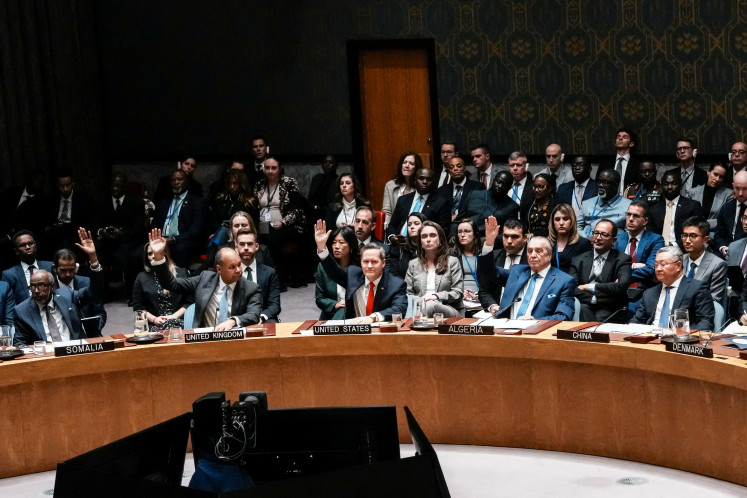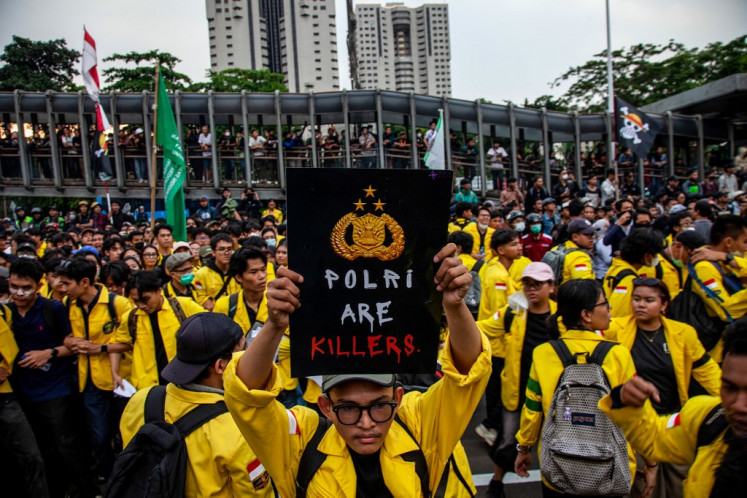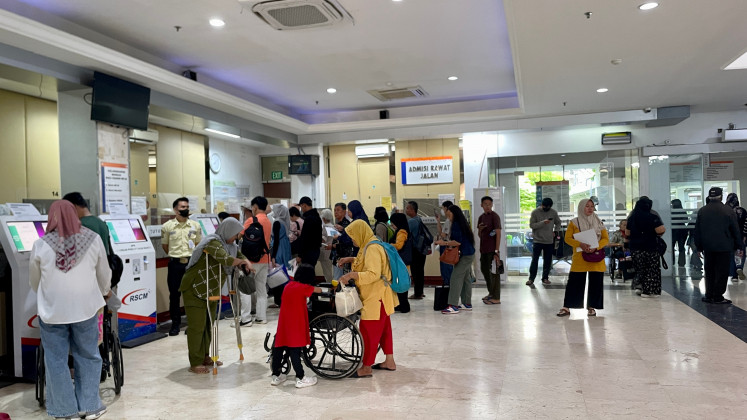Popular Reads
Top Results
Can't find what you're looking for?
View all search resultsPopular Reads
Top Results
Can't find what you're looking for?
View all search resultsPapuans demand end to everyday racism
Change text size
Gift Premium Articles
to Anyone
F
or years, media coverage of Papua has straddled narratives on politics, natural resources management, human rights, development and national security, attracting attention from around the world.
However, there is one issue that is still rarely discussed in public – the casual racism experienced by native Papuans in their day-to-day lives.
“I remember I sometimes regretted my decision to study in Java. If only I had known it would be that hurtful, I would have just gone to a university in Sorong,” Norce Herlin Mak Momao, 24, told The Jakarta Post recently.
Like many young Papuans, Norce left Sorong, her homeland, in 2013 and flew to Yogyakarta to go to university there, hoping to benefit from better higher education standards.
It was her first time living far away from her family, but she quickly learned how people tended to look at her and treat her differently because of her appearance or because she was from Papua.
The first few years were the hardest for her, Norce said.
Finding a place to stay, for instance, was unnecessarily difficult. Once, the owner of a rooming house refused to take her in despite a sign advertising a vacancy up front. She was told there were not any rooms available.
“I think when they see Papuans they have this belief that we are mean human beings who will bring trouble to their place,” Norce said.
Oftentimes, even when she was with friends or family in public places like malls and tourist sites, strangers would casually take out their mobile phone to record or take pictures of her without her consent, all the while giggling among themselves and making her feel like a laughing stock.
“One time I was so annoyed that I grabbed the cellphone from one of them and deleted the video of me they took. I told them, ‘Do you think I’m an animal that you could treat me this way?’” Norce said. “They just went silent. They were adults, not some children. I was really angry.”
Norce is now pursuing a master’s degree in law and working at a legal aid organization in Yogyakarta. She would return to Papua after graduating, she said, so that she could continue her work at a human rights organization.
Discussions on racism in Papua have flourished in online seminars and on social media following the death of black American George Floyd, which galvanized the #BlackLivesMatter movement in the United States, which rippled across to Indonesia. A number of local groups began to discuss racism in the country by campaigning that #PapuanLivesMatter too.
Efforts to end years of racism against Papuans have not progressed fast enough, activists have bemoaned, but they believe the growing debate and sense of solidarity with the minority could be a good opportunity for change.
“Racism has been happening for decades in Papua, but these discussions can be a positive start, as more and more people start to recognize these public issues and start addressing the problem,” Elvira Rumkabu, an international relations lecturer at Cenderawasih University, said on Sunday.
“I believe this will bring change. We can’t end racism alone, we must do it together.”
Elvira said people had been reluctant to discuss issues related to Papua, mostly due to the running narrative that there are only two sides of the equation: Separatism or the undisputable Unitary State of the Republic of Indonesia (NKRI).
“That’s the only narrative we have been fed. It has framed the discussion in a way that snuffs out any necessary debate on humanity. There is a fundamental human issue here that must be addressed; discussing Papua is discussing humanity,” she said.
Even in their hometowns, Papuans still face everyday racism.
Yuliana Langowuyo, 37, the director of the Secretariat for Justice and Peace (SKPKC) Fransiskan Papua in Jayapura, shared just some of her stories that prove how casual racism can easily be found in Indonesia’s two easternmost provinces.
Yuliana recounted the several times that non-Papuan commuters would cover their noses whenever she hopped on an angkot (public minivan) in Jayapura. “I could tell that people like that were new in town, because people don’t do that if they’ve been living here for years. It still makes me angry, though,” she said.
It is not just about the slurs and hurt feelings that are visible in the everyday experiences of native Papuans. Yuliana said she also saw that discrimination was baked into the government’s development projects.
While more and more people have started to recognize the problem and tried to educate themselves about the struggles of everyday Papuans, activists have criticized the state for being so seemingly unmoved by the current changes underway.
In a recent online discussion held by Human Rights Watch Group Indonesia, a National Commission on Human Rights (Komnas HAM) commissioner, Choirul Anam, highlighted that there was still no law enforcement measure that effectively addressed acts of racism in Indonesia.
The people involved in alleged racial abuse against Papuan students in East Java last year were not even charged for their racist acts. Choirul said these people, who included military personnel and members of the general public, were instead charged with disorderly conduct.
“We have failed to seriously address the matter at the heart of this racism case,” the commissioner said. “The government must use all the instruments at its disposal – from law enforcement, prevention to self-correction – to end racism.”









